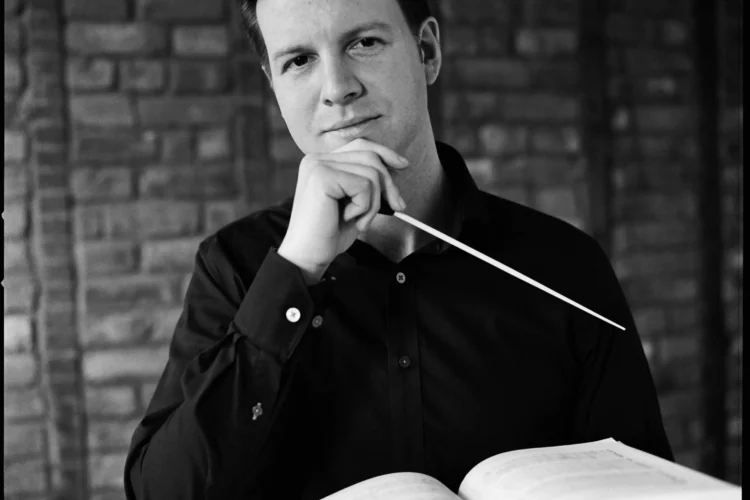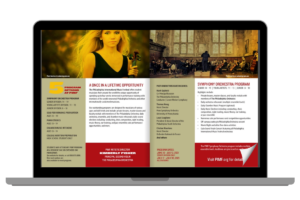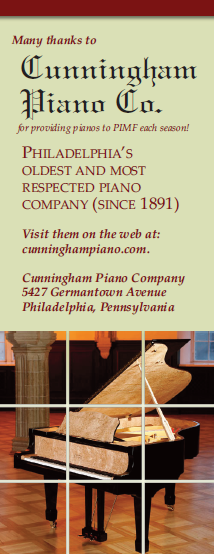SHOOTING STAR ALERT: Philadelphia Orchestra Conducting Fellow Tristan Rais-Sherman will be at PIMF in June, guest conducting the Senior Orchestra, guest coaching the Chamber Music Program, and leading the full camp sight-reading sessions.
If you haven’t heard of him, welcome out from under that rock! JK, we’re lucky to be up to our chin-rests in classical music superstars on the PIMF faculty, so it’s easy to lose track sometimes.
Please accept these fun facts on Maestro Rais-Sherman:
- He started out on cello in 4th grade but his first real passion was ELECTRIC GUITAR. “I really wanted to be a rock star or a pop star at first.”
- He decided to become a conductor at age 14 during a live performance of Mahler’s “Resurrection” Symphony: five movements for a huge orchestra, soprano and contralto soloists, and chorus, clocking in at 90 minutes. A big change from the typical 4-minute classic rock tune. “That changed my life completely and got me really fascinated with classical music in general, but specifically, wanting to conduct,” he told us. “I just really wanted to be in the middle of all that sound – it was just so exciting and electrifying and it was just ‘YES!’ This will make the most use of all my skills and my talent, and yeah, I was just really drawn to it.”
- Maestro Rais-Sherman went on to earn degrees in Cello Performance and Music at Ithaca College, (where “I almost got an Art History minor – I’ve always been fascinated by how history and the arts intersect and reflect each other and influence each other.”); a Masters from the University of Michigan in Orchestral Conducting and an Artist Diploma in Orchestral Conducting from the New England Conservatory of Music (where he’s also a guest conductor.)
- He’s a multi-dimensional artist exploring the intersection of technology and music; driven to create the future of classical music through unconventional and innovative means. It helps that his closest friends include many people who have no ties to music: “Because often times when you’re performing, you’re performing for people who are not musicians, who need your help to bridge the gap, to understand the message of the music that you’re playing, why you’re playing it, all this stuff.”
- He discovered Twitch during the pandemic and used it to explain classical music to an entirely new audience, including gamers whose exposure to symphonic music until then may have been mostly the (often-exceptional!) soundtracks for video games. BUT, BUT, BUT: while Maestro Rais-Sherman thinks artificial intelligence (AI) is amazing, he believes “nothing will ever replace the human, emotional, spiritual, creative impulse.”
- In addition to the PhilOrch gig, he’s served as cover conductor for the NEC Philharmonia, the St. Louis Symphony, the Tulsa Opera, the Greater Bridgeport Symphony, and Syracuse Opera. He’s spent years on the podium in New York City before youth ensembles: as director of orchestras at the Kaufman Music Center’s Special Music School, assistant conductor of the New York Youth Symphony and conductor of the Harmony Program Youth Orchestra. He’s also wielded his baton over the Western Connecticut Youth Orchestra String Ensemble. He’s also worked at Jimmy John’s, he’s painted houses, and has worked as a computer programmer. “I’ve experienced so many situations and different professional situations and you learn so much about people – what makes them tick. So, I highly recommend having broad interests and a broad base of experience, because it will enrich your music making and your musical personality.”
- He considers sight-reading an essential skill because the better you get at it, the faster you get at processing the music and the sooner you get to the heart of the piece for deeper interpretation and performance. Buckle up – Maestro Rais-Sherman thinks the best sight-reading happens under PRESSURE. BUT, BUT, BUT: “What I really want to emphasize (at PIMF) is the joy of the music-making and the energy of the music-making,” he explained. “So, I really push all my students to engage authentically and with their heart and mind in the music-making process. Push themselves into the score, seek to understand what the composer wrote, and be fearless in bringing that message out.”
- We only have him for the June session because in July, he travels to Germany as a finalist in the prestigious Gustav Mahler Conducting Competition with the Bamberg Symphony. Quite the ride since that 14-year-old got his musical mind blown by Mahler’s “Resurrection!” “So, I guess the moral of the story there is to go see concerts and be open to different styles of music,” he advised. “I have very broad interests and I think that has been one of my greatest assets.”
There is still time to register for some of PIMF’s June session programs, and July has even MORE exceptional programming with principal players from The Philadelphia Orchestra. You may even be eligible for a scholarship (hint hint select instruments hint hint extending from one week to two hint hint worth checking in with us regularly not-so-subtle hint!)
Photo Credit: Alex. S. K. Brown




